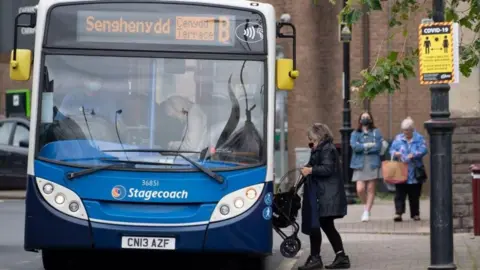Numbers of Welsh bus users lag behind rest of Britain
 Getty Images
Getty ImagesWales' bus network has recovered slower post-Covid than any other nation in Great Britain, a Senedd report has said.
Passenger numbers in Wales in the year to March 2024 were 78.3% of the levels before the pandemic - lagging behind both England and Scotland.
The figures have been blamed on fewer older people using concessionary fare passes.
Members of the Senedd's climate change committee urged Welsh government ministers to get to the bottom of the issue. The Welsh government said it would study the report.
Transport for Wales (TFW) said recently published plans to bring buses under public control would "allow us to really focus on providing an integrated public transport network that works for the people of Wales".
According to data from the UK government bus passenger numbers in the 12 months to March 2024 were at 78.3% of where they were in March 2020.
That compares with 92.5% in Scotland, 89.5% in England and 89.5% for Great Britain as a whole.
Cabinet secretary for transport, Ken Skates, had previously suggested that while fare-paying passenger numbers had recovered, concessionary travel had not.
The Senedd committee's report said TFW chief executive James Price had "pointed to Wales' historically high proportion of older bus users and suggested that the pandemic had led many to use online services, which had reduced their need to travel".
People aged 60 and over in Wales are entitled to a concessionary bus pass, while in England bus passes are provided at state pension age.
Bus fares in England have also been capped, at £3 since December 2024, while there is free bus travel for under-22s in Scotland.
The bus industry in Wales is due for a major shake-up under plans to bring it back under public control, allowing to officials to have more in the say in the shape of the network.
Mr Price told the committee the new model could lead to a "period of sustained passenger growth" if it led to services being more reliable and easier to use.
Performance issues blamed on rolling stock
The report from the climate change committee follows the cross-party group's annual scrutiny work of the TFW transport body, which runs most of Wales' trains.
Delays to new trains were also blamed for problems in performance at the rail operator.
The report said while Skates had said there had been "significant improvements" in punctuality and reliability between April and June 2024, this was followed by a decline.
Mr Price said the performance was plateauing rather than declining, and said services outside of the core Valley line network had faced disruption from extreme weather.
But at an evidence session he also blamed the speed that train builder CAF was producing some of the new trains promised by TFW.
Speaking in January, Mr Price said the service was dealing with "a slightly lower number of CAF units, new train units, coming out of the maintenance facility per day than we would like to see.
"We are roughly four units short a day," he said.
"What it does mean is that, occasionally, we are short-forming a service with fewer carriages than we would want to have on there, which I think has led to a plateauing, as I said, rather than going backwards."
The committee said TFW should use "all options available to them" to ensure contracts for new trains were met.
"Given the impact on the public purse, this should include, if necessary, asking the Cabinet Secretary for Transport to intervene," it said.
TFW said: "We now have over 50% of our brand new trains running across Wales and we're within the final phases of delivering the South Wales Metro.
"The recent Bus Bill announcement will allow us to really focus on providing an integrated public transport network that works for the people of Wales."
Transport Secretary Ken Skates said: "We will study the report carefully and provide a full response.
"We already have bus services such as Traws Cymru were passenger numbers are increasing, and this is an indication of what we can achieve across Wales. New trains are being delivered.
"We are seeing real change on our railways, with, for example, over 80% of journeys on the North Wales Main Line on new trains. TFW are also continuing to build on performance improvements made over the past year."
